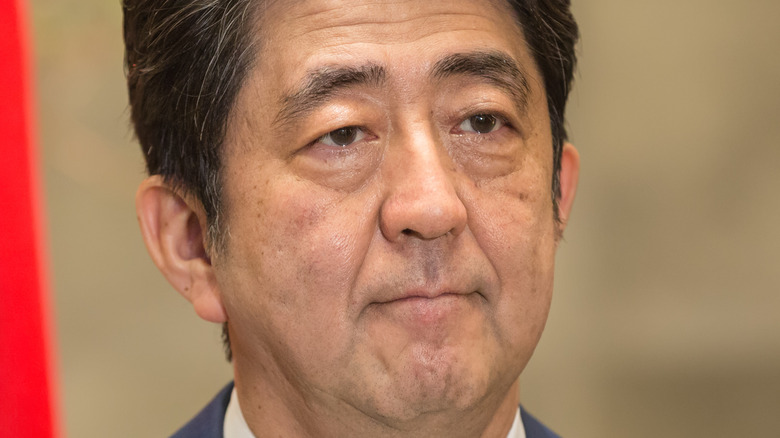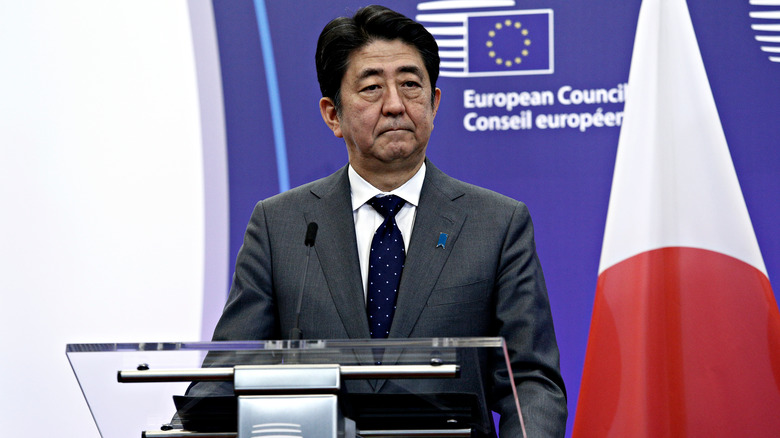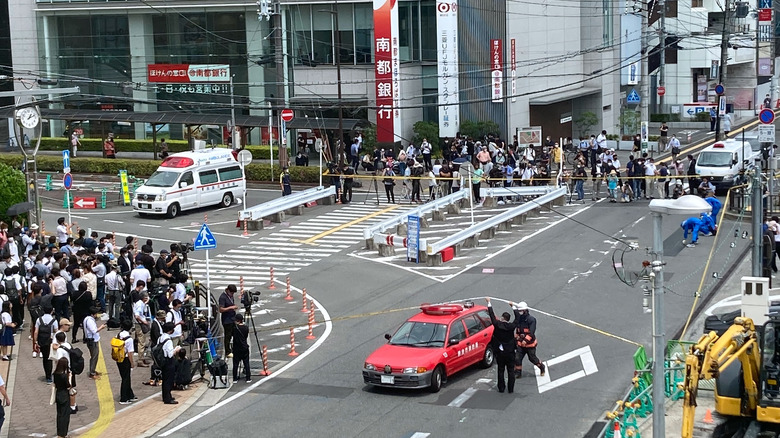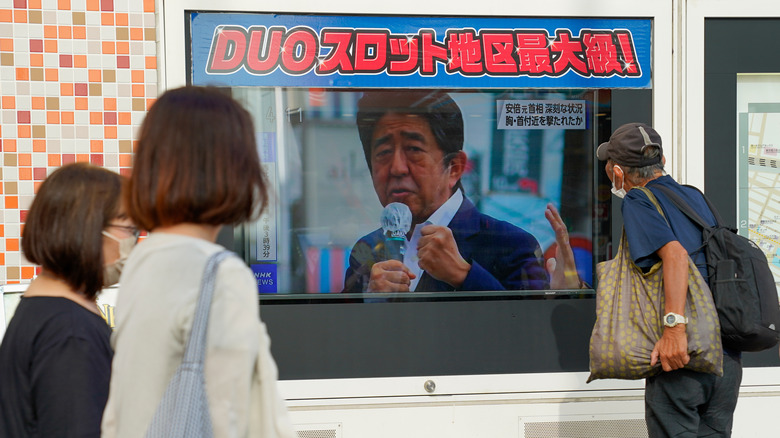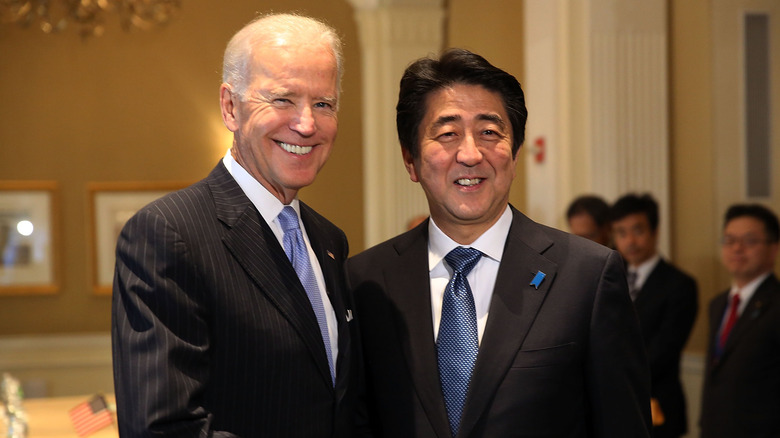The Assassination Of Japan's Former Prime Minister Shinzo Abe Explained
On July 8, the world was shocked by the assassination of former Japanese Prime Minister Shinzo Abe. The longest-serving prime minister in Japan's history was giving a speech on the streets of Nara, a city in the southwest part of the country, per NPR. While Abe was in the midst of his speech, a pair of shots rang out and the former prime minister collapsed to the ground. Security quickly pounced on a man in his 40s who was arrested in connection with the murder, which was carried out with what appeared to be a homemade firearm, per CNN. The suspect later admitted to shooting the politician
Despite having left his position as Japan's prime minister in 2020 due to health issues, Abe was still very active in national politics, especially within the Liberal Democratic Party (LDP). The LDP, according to Britannica, is the country's largest political party and is known for working closely with business interests and championing a pro-United States foreign policy. As news circulated that Abe had succumbed to his injuries, there was an outpouring of tributes from world leaders around the globe.
Who was Shinzo Abe?
According to Britannica, politics ran in Abe's family. There were two former prime ministers in his family, including his grandfather, Kishi Nobusuke, who held the position in the late 1950s, and great uncle Sato Eisaku, who was in office from 1964 to 1972. Abe moved to the United States and studied political science at the University of Southern California, but returned to Japan in 1979.
He became active within the Liberal Democratic Party upon his return to Japan, and in 1982 he started working for the country's foreign minister, who just so happened to be his father, Abe Shintaro. As Abe's political career progressed, he became well-known for his hard-line stance toward North Korea. This became an especially popular position after North Korea admitted that it had kidnapped more than a dozen Japanese citizens in the 1970s and '80s.
Abe ascended to the prime minister's office for the first time in 2006, per Biography. He became Japan's first prime minister who was born after World War II. His first term only lasted one year, as he resigned in 2007 for health reasons. However, he returned to the office in 2012 and stayed there until he resigned in 2020, again due to health issues.
The Assassination of Shinzo Abe
According to Fox News, Abe was giving a speech on a street in the city of Nara on July 8, ahead of Japan's parliamentary elections that weekend. Videos and pictures before and during the event show Abe surrounded by a decent-sized crowd while he delivered his speech with a microphone in hand. A brief video of the first shot being fired shows a burst of smoke coming from behind the former prime minister while a loud blast — more like an explosion than a gunshot — can be heard. Police later revealed that although the first shot missed Abe, he was hit by the second and collapsed to the ground, according to Fox News.
The clip was posted to Twitter by historian Nick Kapur, who also reported that bystanders who were there to hear Abe's speech reported lingering smoke after the shots had been fired. This was one of the early indications that the murder weapon was homemade. Tweeted pictures of the weapon eventually emerged that showed it to be a crude, double-barreled weapon held together with black tape.
Abe quickly received medical attention at the scene but was then rushed to the hospital. Current prime minister Fumio Kishida — who is also a member of the LDP — made an early return to Tokyo from a campaign trip after news of the shooting broke. Kishida initially announced that Abe was in "severe condition." A few hours later, however, Abe's death was announced.
A suspect was identified and apprehended
Within moments of two shots being fired at Abe, security tackled a man later revealed to be 41-year-old Tetsuya Yamagami, according to Nara-nishi police (via CNN). Tetsuya was unemployed and told police that he did not like the former prime minister and wanted to kill him, but that it didn't have to do with political beliefs or ideologies, per Fox News.
Gun violence is extremely rare in Japan, a nation with strict laws that outlaw handguns and makes legal firearms like shotguns and air rifles difficult to obtain. Buying a gun requires a person to attend a class, pass a written test, undergo a mental health assessment, pass a background check, and pass a shooting-range test with a required accuracy of 95%. Even after obtaining a firearm, it has to be registered with the police, who inspect the weapon every year. Firearms also need to be stored separately from ammunition in locked compartments.
However, a homemade weapon like the one confirmed to have been used in the assassination of Shinzo Abe would have skirted these laws. Upon searching Tetsuya's apartment, authorities found several more homemade items that appeared to resemble pistols, as well as possible explosives.
World leaders offered tributes
After it was announced that Abe had died, world leaders from across the political spectrum offered their condolences. United States President Joe Biden said that he was "stunned, outraged and deeply saddened" by Abe's death, per Fox News. "He was a champion of the Alliance between our nations and the friendship between our people," Biden said.
Former President Donald Trump wrote on his social media platform, Truth Social, that Abe was "a true friend of mine and, much more importantly, America," per CNN. Trump continued, "This is a tremendous blow to the wonderful people of Japan, who loved and admired him so much. We are all praying for Shinzo and his beautiful family!"
Other world leaders that paid their respects to Abe included Indian Prime Minister Narendra Modi who tweeted, "I am shocked and saddened beyond words at the tragic demise of one of my dearest friends, Shinzo Abe. He was a towering global statesman, an outstanding leader, and a remarkable administrator. He dedicated his life to make Japan and the world a better place." British Prime Minister, Boris Johnson, who announced his resignation the day before Abe's death, said he was "utterly appalled and saddened" by the assassination.
